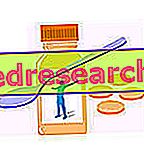Hunger
Hunger is one of the primary drives, an intense stimulus linked to the primordial survival instinct. Yet despite this, food intake is often influenced by factors that have very little ancestral.

Unlike what happens in animals, hunger for man is not the simple result of physiological needs. We realize it when at the end of a hearty meal, despite the fact that the belt of the trousers clearly tells us to stop eating, we cannot give up a slice of dessert. Another common experience concerns the inability to break away from a chocolate jar, despite a strongly fought psyche between greed, guilt and the first warnings of indigestion, we suggest otherwise.
Nervous control of hunger
The control of food intake in humans fully reflects the extraordinary degree of efficiency and genius with which the whole organism is organized. Two hypothalamic centers, influenced by numerous neurotransmitters and hormones, send signals that push or not to search for food. In conditions of fasting the center of hunger is active, after the meal that of satiety prevails. These centers receive innumerable regulatory signals, some of which are more relevant than the others. The intense research on the physiological mechanisms underlying that fearful and worrying disease called obesity has led to the formulation of different theories, we see the main ones.
| GLUCOSTATIC THEORY | LIPOSTATIC THEORY |
The most important stimulus on appetite regulation is blood sugar. Brain receptors constantly monitor the concentration of glucose in the blood. As soon as the blood sugar tends to fall below the guard values, the hunger stimulus is triggered. Conversely when blood glucose rises too much the brain understands that it is no longer necessary to eat. | The centers of hunger and satiety are heavily influenced by the body's fat deposits. When lipid stockpiles begin to run low the hunger center stimulates food intake. As soon as the fat deposits are reconstituted the brain receives an inhibitory signal on the stimulus of hunger. |
In support of the lipostatic theory, an interesting study on the relationship between leptin and overweight was published a few years ago. This hormone, encoded by the "obesity gene" (OB gene), acts at the hypothalamic level, determining the sense of satiety. If the fat deposits increase the production of leptin is encouraged, if instead they decrease, the caloric intake is favored by the reduced secretion of the hormone.
Mice lacking the OB gene, given the correlated absence of leptin, fatten visibly. However, things are not so simple in humans, given that many obese people are so despite presenting high plasma concentrations of leptin.
How to explain all this? The answer is the same that we gave to those who asked us why they suffered from hypercholesterolemia despite a cholesterol-free diet, or who suffered from osteoporosis problems despite the use of massive calcium and vitamin D supplements.
The human organism is based on very fine regulation systems that aim to maintain homeostasis, ie the stability and balance of the internal environment. It follows that every action is followed by an equal and opposite reaction that tends to bring the system back into balance. To preserve health and improve the efficiency of the system, the body resorts to an integrated network of signals, able to interact and influence each other. Thus, if one of them goes haywire, the stability of the system is in any case ensured by the activation of signals with a similar function.
Likewise, hunger is the result of an intricate cluster of neuroendocrine impulses activated by physical, chemical, mechanical and psychological signals.
Some peptides that modulate food intake | |
| PEPTIDE | SOURCE |
They increase food intake | |
| Neuropeptide Y (NPY) | Hypothalamic |
| Orexine (also called hypocretins) | Hypothalamic |
| galanin | Hypothalamic |
| Melanin-concentrating hormone (MCH) | Hypothalamic |
| Ghrelin | Stomach |
Food intake decreases | |
| CCK | Small intestine; neurons |
| Corticotropin-releasing hormone (CRH) | Hypothalamic |
| Α-melanostimulant hormone (α-MSH) | Hypothalamic |
| CART (Cocaine and Amphetamine Regulated Transcript) | Hypothalamic |
| Glucagon-like peptide 1 (GLP-1) | Intestine |
| Enterostatina | Intestine |
| PYY 3-16 | Intestine |
| SOURCE: Physiology. An integrated approach Silverthorn Dee U. | |
Psychological Factors
This is why a true cure for obesity, an effective cure, must take into consideration anatomical, physiological, biochemical and psychological elements which, taken together, make it possible to identify valid therapeutic pathways.
The act of eating does not necessarily indicate a need for food, but it can hide anxieties, fears and positive feelings, such as the desire to share what you have with your loved one. In the search for food, cultural factors also take over: while in the industrialized countries few would be enthusiastic about the idea of a worm-based lunch, in some regions of Africa the caterpillar is one of the most appreciated foods.
Mood, the unconscious and rationality are mainly responsible for attacks of uncontrolled hunger. Depression, for example, is often accompanied by anxious hunger attacks of those foods, such as desserts, which evoke pleasant memories and temporarily improve the mood.
Hunger and appetite are not synonymous . While the first term is used to indicate that instinctive and uncontrollable feeling that leads us to the immediate search for food, the appetite devotes more attention to the qualitative aspect of food.



